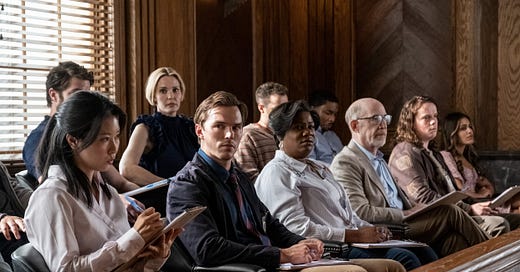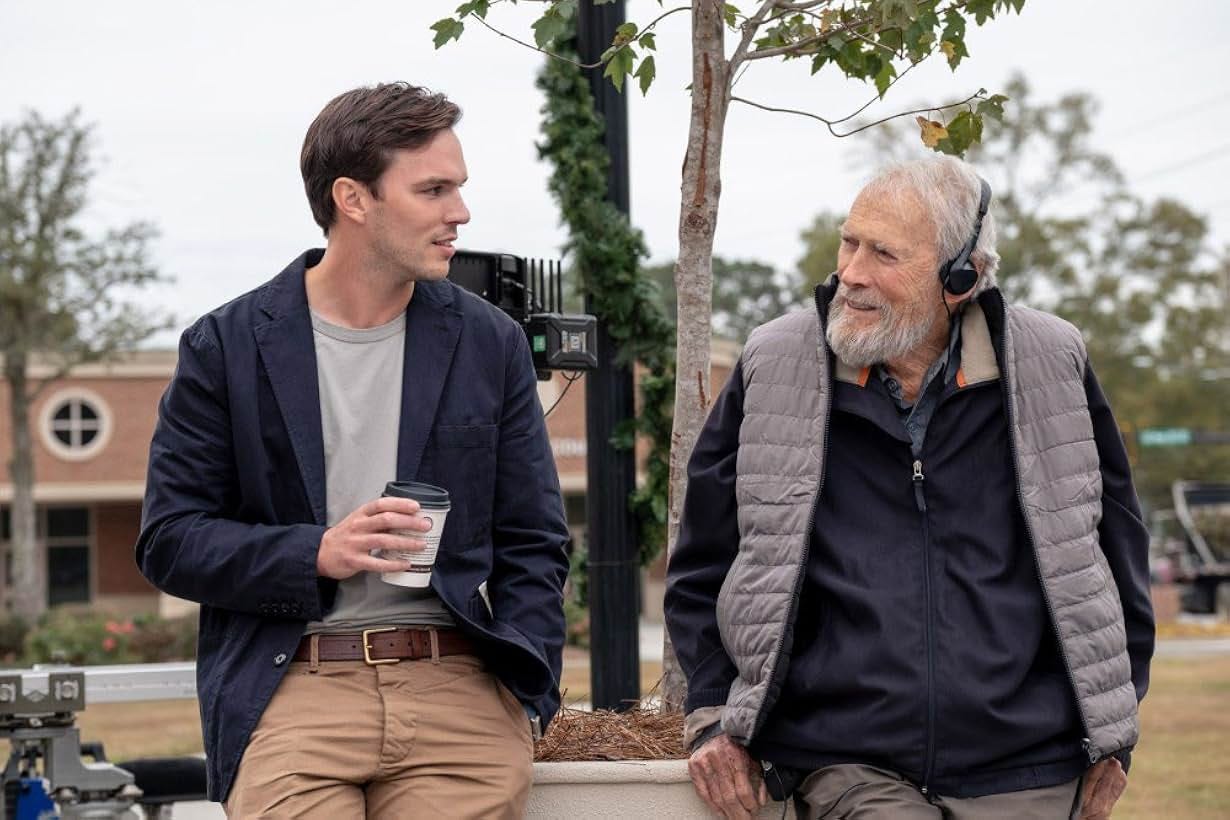Justin (Nicholas Hoult, c.) sits uneasily on the jury where his own fate hangs in the balance
Juror #2 (2024)
In theaters
This is a story of a crime. It focuses on a Savannah, Georgia courtroom where a defendant is accused of murder. Which suggests a search, or at least a yearning, for justice.
That’s a theme the director, Clint Eastwood, has explored on large canvases in movies set in the American West, in the war-torn Middle East and in the Pacific during World War II.
What’s satisfying here once again is Eastwood’s mastery of intimate, revelatory human gestures which can lead to big trouble. Put up your dukes, his movies seem to say to the people in them and to the audience. But this time he throws down the gauntlet with only his trademark husky whisper.
I’ve never thought of Eastwood as a minimalist, but that’s what he is here. The twisty script, by Jonathan A. Abrams, is a model of storytelling that doesn’t fudge critical details. It all turns on details. I’ve never paid closer attention at an Eastwood movie.
Seeking justice is the last thing on the mind of Justin Kemp (Nicholas Hoult) when he’s selected for jury duty. His pregnant wife Allison (Zoey Deutch), nearing the end of her third trimester, hopes he can get it done so they can concentrate on the new life they’re bringing into the world.
Like any juror, Justin knows nothing about the case until he’s seated in the jury box. The steely-eyed prosecutor Faith Killebrew (Toni Collette) in her opening statement declares that the man on trial, James Sythe (Gabriel Basso), is a cold-blooded killer. Justin keeps his cool until she lays out the facts.
As she states her claims we’re taken in flashback at nighttime to a large, noisy bar (waggishly named Rowdy’s Hideaway; Eastwood made his name playing Rowdy Yates on the TV Western Rawhide).
James and his girlfriend Kendall Carter (Francesca Eastwood, the director’s 31-year-old daughter) get into a shouting match.
Things grow heated, a beer bottle is smashed, and a fed-up Kendall storms out into pouring rain. James follows her and they keep arguing ’til she tells him they’re through, gives him the finger and marches off into the rain. She’s out of sight when we see James stifle his anger and decide to pursue her in his truck.
Only back in the courtroom do we hear Faith insist to the jury that a furious James eventually caught up to Kendall and bludgeoned her to death. Her body was found at the bottom of a ravine with a fatal head wound.
The movie deftly starts charting two parallel stories. Listening to the prosecutor, Justin remembers that he was in the bar that night. In flashback we see him leave around the same time Kendall did.
Driving home he suddenly feels his car hit – something. What, he’s not sure. He climbs out and sees a Deer Crossing warning sign and tells himself he must have struck a deer.
But in the courtroom, he realizes that the spot where he stopped his car is precisely at the top of the ravine where Kendall’s body was found. Did his car strike not a deer but the fleeing Kendall, the woman that James is charged with killing?
This may be Eastwood’s most serene movie, yet one where every dark deed is finally brought to light. With no visual extravagance, no grisly mayhem, no cartoonish “evil”.
Tellingly, even the prosecutor admits that no weapon has been found that could have inflicted the deadly wound. Of course, James’ firebrand defense attorney (Chris Messina) maintains the assault never happened. James simply drove home.
To repeat, this story is about, first and foremost, a crime. You’ve got to get the perp right if you’re going to get to justice. Who did it?
Fearing it’s him, Justin now faces a chilling dilemma. Does he tell the judge what he fears might have happened, or does he let deliberations proceed, knowing the jury might convict a (possibly) innocent man?
Justin has a lot to lose. He’s a recovering alcoholic, and he and Allison lost twins in a miscarriage. So, his hard-won sobriety and his approaching fatherhood are two solid anchors in his life.
The jurors are leaning toward a guilty verdict, but Justin, to extricate himself from the bind he’s in, tries to instill in them “reasonable doubt”.
He remains uneasy, and Hoult gives a searing portrait of a man coming unraveled. Justin makes the classic desperate move. He returns to the scene of the crime, trying to determine if he actually took a life.
Hoult and Eastwood on set; actor and director collaborate on a riveting performance
And he’s not the only one who finds the prosecutor’s case shaky. Another juror, Harold (J.K. Simmons), who happens to be an ex-cop, does exactly what he knows no juror should. He, too, goes to the scene and later agrees with Justin that the evidence to convict James isn’t airtight.
Faith, the savvy prosecutor, who’s also running for District Attorney, begins to have doubts.
Politically, a guilty verdict helps her win the election, but she can’t help wondering, What if Kendall was hit by a car? Were any cars in the area shortly after the incident taken to garages for repairs? Who were the owners?
In the intense jury deliberations, the majority ready to convict grows increasingly angry as Justin tries to steer them toward acquittal. This standoff has an ironic similarity to 12 Angry Men. But the turnaround in that movie bends toward fairness, while here that’s elusive.
This is all handled with an aboveboard commitment to uncovering the facts. The disarming straightforwardness is deeply, surprisingly, pleasurable.
And we can only be kept on edge if the performances are reined in yet still bristle. Justin’s fellow jurors are increasingly suspicious of his delaying tactics that put a unanimous guilty verdict just out of reach, as he keeps a handful of jurors not quite ready to convict.
The most tempestuous is Marcus (Cedric Yarborough), who isn’t having any truck with Justin’s “doubts”. Yarborough gives a powerfully obstreperous performance, and Eastwood sees that it's scaled up just enough to keep the other jurors wary of Justin.
Yet the script gives Justin the person his due. Deutch as Allison, hugely pregnant and filled with affection for Justin, makes her belief in him more touching as it begins to waver, when her own doubts can’t be stilled. It’s an exquisite turn in what could have been a conventional loyal spouse role.
The shifting events unfold against a handsome, downright sedate backdrop. Cinematographer Yves Bélanger gives the courtroom scenes and the Savannah exteriors a gorgeous autumnal glow, the sharpest visual contrast to anything approaching the macabre.
This may be Eastwood’s most serene movie, yet one where every dark deed is finally brought to light. With no visual extravagance, no grisly mayhem, no cartoonish “evil”.
Easy gets the job done. Eastwood is 94, and it’s thought this could be his last movie. If that turns out to be the case, he isn’t just riding into the sunset. He’s creating and leaving us with a sunset we can keep seeing by. What a fine eye. What a thoughtful artist.






You had me at Nicolas Hoult! I stopped reading halfway through just in case of spoilers. You’ve sold me on this one!